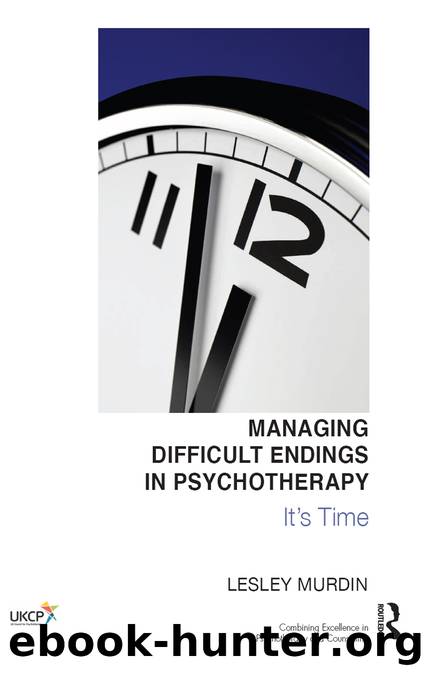MANAGING DIFFICULT ENDINGS IN PSYCHOTHERAPY by Lesley Murdin

Author:Lesley Murdin
Language: eng
Format: epub
Publisher: Routledge
Omnipotence
If a patient achieves enough self-confidence to discuss ending and tries to seek to negotiate it with the therapist, reactions vary. Some therapists will not be sure of their own view. Is this person ready to end or not? For many this is appropriate doubt and they will perhaps consult their supervisors. Others will claim to know all the answers. Pronouncements about leaving as a defence or leaving to avoid the breakthrough that is just on the horizon may be close to the mark, but if pronouncements are delivered with a conviction of being right, they may be harmful. The therapist will think that she knows whether the wish to end is defensive and will not always have sufficient evidence to interpret defences. The patient has the option of staying and feeling ashamed of his level of compliance, or feeling resentful. In either of those cases, he is not likely to continue to improve. In fact, he is most likely to develop an inner refusal to change or improve in order to prevent the therapist from reaping any reward for behaviour which will probably echo the apparent power of the parent.
If the patient refuses to accept the therapistâs demand that he should stay in therapy longer, he is faced with the option of walking out without the blessing of his therapist. This may repeat other bad or unsatisfactory endings.
Robert was a young gay man who came to see a female therapist, Dr Allen. He had grown up an only child whose mother idolised him. His father was a salesman who was often away. He had told his mother that he realised he was gay as an adolescent. She accepted that and in fact seemed pleased about it. During the therapy, it emerged that she might have been pleased because no other woman was to take her place. Robert was shocked about this understanding, but he could see that her words and actions bore it out. He was unable to form a lasting relationship with a man and had described many one night stands when he enjoyed the risks of gay sex without relationship.
He told his therapist that he might as well leave because clearly she could not help him find a satisfying relationship. Dr Allen was very concerned and told him that she thought he was avoiding staying and working through his anger with his mother. He then became very angry with Dr Allen and walked out.
The sad thing about this story is that Dr Allen was probably right, but she merely exacerbated the anger and did not provide enough possibility of enabling Robert to feel that his anger could be managed in a non-lethal way.
Download
This site does not store any files on its server. We only index and link to content provided by other sites. Please contact the content providers to delete copyright contents if any and email us, we'll remove relevant links or contents immediately.
| Administration & Medicine Economics | Allied Health Professions |
| Basic Sciences | Dentistry |
| History | Medical Informatics |
| Medicine | Nursing |
| Pharmacology | Psychology |
| Research | Veterinary Medicine |
Periodization Training for Sports by Tudor Bompa(7929)
Why We Sleep: Unlocking the Power of Sleep and Dreams by Matthew Walker(6366)
Paper Towns by Green John(4808)
The Immortal Life of Henrietta Lacks by Rebecca Skloot(4264)
The Sports Rules Book by Human Kinetics(4081)
Dynamic Alignment Through Imagery by Eric Franklin(3925)
ACSM's Complete Guide to Fitness & Health by ACSM(3827)
Kaplan MCAT Organic Chemistry Review: Created for MCAT 2015 (Kaplan Test Prep) by Kaplan(3805)
Introduction to Kinesiology by Shirl J. Hoffman(3629)
Livewired by David Eagleman(3535)
The River of Consciousness by Oliver Sacks(3421)
The Death of the Heart by Elizabeth Bowen(3344)
Alchemy and Alchemists by C. J. S. Thompson(3300)
Descartes' Error by Antonio Damasio(3168)
Bad Pharma by Ben Goldacre(3107)
The Emperor of All Maladies: A Biography of Cancer by Siddhartha Mukherjee(2935)
The Gene: An Intimate History by Siddhartha Mukherjee(2929)
The Fate of Rome: Climate, Disease, and the End of an Empire (The Princeton History of the Ancient World) by Kyle Harper(2878)
Kaplan MCAT Behavioral Sciences Review: Created for MCAT 2015 (Kaplan Test Prep) by Kaplan(2823)
